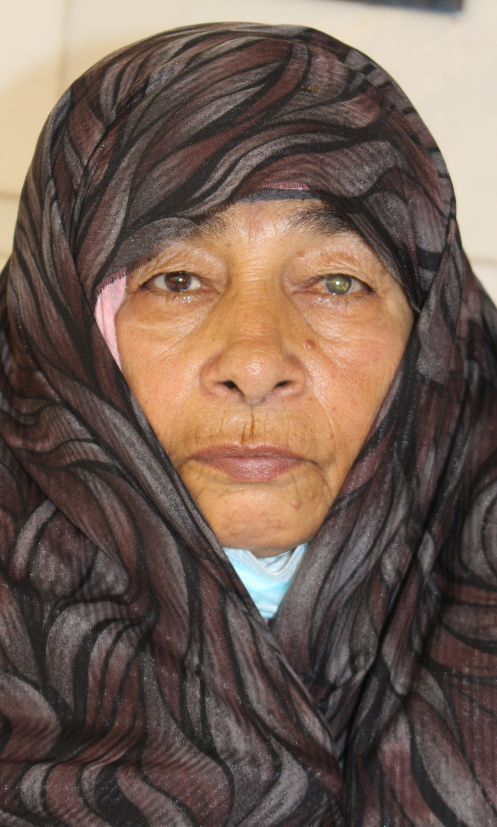Rahima's story - surviving COVID-19 and a difficult winter in Afghanistan

Thanks to funds raised by the Afghanistan Crisis Appeal, Rahima received two payments to help her cover her expenses - with a life-changing impact for her family.
Rahima, 60, from Injil district, Afghanistan, lives with her three daughters and two grandchildren. Rahima is unable to work due to disability, and with limited work opportunities available for her daughters, the family struggled to afford their living expenses and feared being made homeless. Fortunately, she heard about our project with Humanity and Inclusion and requested a referral for support.
“I cannot do anything because of my age and disability. I cannot even hold a cup of tea. It's very painful for me when I can't take a bath alone or do anything else. We do not have a male head of household at home, and this makes our situation even worse due to traditions and cultural constraints. I live with the alms that sometimes neighbours give me.”
“With great difficulty, I approached the community leader and cried a lot, begging him to add my name to the list of people that could receive assistance by the project.”
The coronavirus pandemic has been particularly devastating for Rahima and her family. Her son-in-law caught the virus and passed away. He was her third son-in-law to die, leaving all three of her daughters as widows. The pandemic has also further limited the work opportunities for her daughters.
“My daughters used to do domestic work in other people's houses to earn money. However, the field of work has become very tight, because people are not allowed to work without a vaccination card, a mask and gloves.
“Most of our neighbours who had a good economic situation emigrated and left the country because of fear of poverty. This led also to the creation of more unemployment; for example, my daughters who worked in several houses remained unemployed after the families migrated.”
Afghanistan experiences freezing temperatures in the winter, and on top of widespread unemployment, food and fuel have become very expensive. Many families are forced to burn rubbish to keep their homes warm, but this can be harmful to their health.
“We had a very difficult experience in the last winter, having to deal with lack of food and fuel. I'm sick and I need a warm place during harsh winter conditions. We used plastic and garbage to heat the house, but the smoke coming from the burnt rubbish made me sicker and I developed asthma. My daughters were unemployed at that time and life was very difficult for us.
Our situation will get worse because I have two operations to do, heart and eye surgery, and I am not able to cover healthcare expenses."
The challenging circumstances that Rahima and her family were facing meant that the payments she received made a huge difference. They meant that Rahima didn’t have to worry about how they were going to eat, was able to pay off her debts, cover the rent, water and electricity bills, and could enjoy celebrating Ramadan and Eid-ul-Fetr with her family carefree. It also helped her to afford healthcare.
“With the first round of assistance, I went to the doctor for my treatment. I checked my heart and paid the water and electricity bills. With the second round of distribution, I bought food. I also paid for the grandchildren's education and bought them stationery and clothes for their school.”
Being able to access healthcare and pay the rent means that Rahima doesn’t have to worry about her health worsening or her family not having a roof over their heads.
“If we are not able to pay the rent in time the house owner might evict us, forcing myself, my daughters and my grandchildren to live by the street or in a tent. The only solution would be sending my grandchildren to work on the street.”
Many families in Afghanistan have faced this predicament, but with our support, Rahima was able to afford her grandchildren's education and ensure the family are better prepared for the next winter.
Rahima told us that she only wished that more help was available for older people and those with disabilities, who are so often overlooked by governments and other initiatives, with a lack of accessible work opportunities or other income.
Older women: the hidden workforce
Globally, older women are contributing unrecognised yet critical support to their families, communities and economies through their paid and unpaid work. Our report, Older women: the hidden workforce gives voice to older women’s experience of work and sets out recommendations for how to address this inequality.
